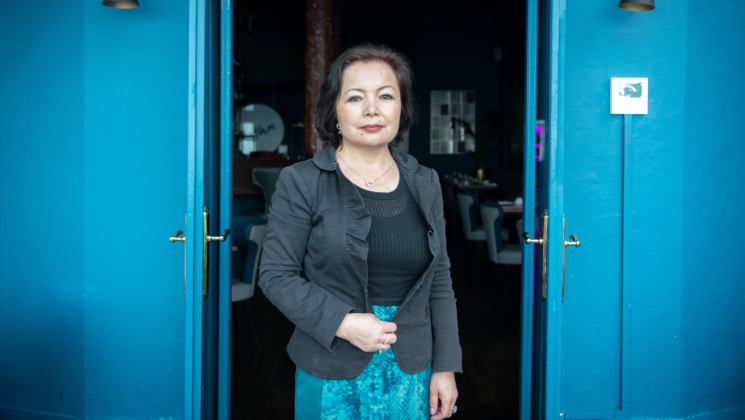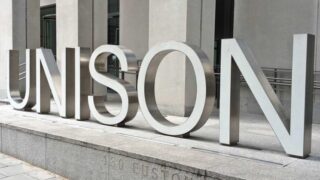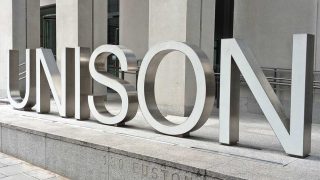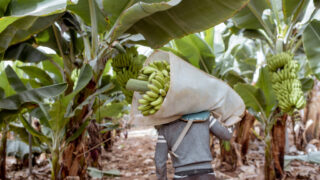Rahima Mahmut (above) recalls the moment when she finally heard from a member of her family, in China, after two months of unreturned calls. It was her brother, who was carefully watching his words, and told Rahima that the family was doing “the right thing” by not being in touch. And then he said, “Leave us in God’s hands.”
That was more than five years ago. She’s heard nothing since.
With all eyes turned towards the war in Ukraine, it’s easy to forget about other tragedies, and other atrocities that are going on in the world. One example is taking place in the north-western Chinese region of Xinjiang, officially known as the Xinjiang Uyghur Autonomous Region, where China is being accused of crimes against humanity and genocide against the region’s mostly Muslim Uyghur population.
The Uyghurs speak their own language, which is similar to Turkish, and see themselves as culturally and ethnically close to Central Asian nations. There are 12 million Uyghurs in Xinjiang. Human rights groups believe that China is detaining at least a million of them in so-called ‘re-education camps’, in reality internment camps, where they are subjected to a catalogue of horrendous abuses, including torture and rape. Thousands more are being held in formal prisons, often for opposing the state.
Many of those who are not incarcerated are forced to work in factories, as forced labourers, both within the region and elsewhere in China. The whole Uyghur population is under constant surveillance and ‘big brother’ control.
Genocide
At the same time, China has been conducting forced sterilisation of Uyghur women, and forced abortions, and is separating Uyghur children from their families – putting them into what the state calls ‘boarding schools’, but, again, activists believe these to be children’s detention camps.
“They are breaking up families, and they are breaking people away from their culture and religion and language,” says Rahima, who is UK director of the World Uyghur Congress, which engages in awareness raising and advocacy for Uyghur human rights.
And she is quite clear: this treatment of her people amounts to a form of genocide.
This is also the conclusion of the Uyghur Tribunal, an independent tribunal based in London, chaired by Sir Geoffrey Nice QC – the lead prosecutor in the trial of Slobodan Milošović – alongside human rights experts and lawyers.
The tribunal was charged with considering whether crimes had been committed against Uyghurs, Kazakhs and other Turkic Muslim minorities in Xinjiang. Having heard first-hand testimony of victims, alongside various expert witnesses, its report in December 2021 stated that Uyghurs were “subjected to acts of unconscionable cruelty, depravity and inhumanity” and found that the People’s Republic of China (PRC) had committed crimes against humanity, and genocide.
The PRC denies all the allegations.
And though the UK parliament has passed a motion that recognises the genocide, the Conservative government has so far refused to follow suit.
Ethical procurement
However, UNISON is fully supporting the Uyghur people, with a very precise, practical focus – against public sector purchasing of products made with Uyghur forced labour.
As well as her role with the World Uyghur Congress, Rahima is the executive director of the UK-based grassroots campaign Stop Uyghur Genocide. Her campaign has now teamed with UNISON and the Helena Kennedy Centre for International Justice, at Sheffield Hallam University, to provide a guide on Uyghur forced labour in the solar industry and solar supply chains.
Over 45% of the global supply of polysilicon, the primary material for solar panels, is manufactured in the Uyghur region. As Rahima puts it: “45% of the world’s solar power is tainted by forced labour.”
Multiple UK public bodies have been found to procure solar materials from companies sourcing polysilicon from the region, including the Ministry of Defence and Scottish Water. As the UK’s solar capacity is set to double by 2025, concerns are mounting that they will get locked into long-term contracts with unethical suppliers.
The guide, which will be launched at a webinar in September is designed to help local authorities and other public bodies make better purchasing decisions and streamline their solar supplier vetting process.
“We are campaigning for public bodies, especially local governments, to be mindful about the solar products that they are procuring,” says Rahima. “Local government can make a difference by sourcing solar panels that are not produced by forced labour. At the moment, no-one is really doing that kind of due diligence work. I think they are just getting things based on the price.”
UNISON’s guidance
UNISON international officer Gemma Freedman adds: “What is happening to the Uyghurs is incredibly disturbing. We know that local government and other public sector institutions want to do the right thing, but they don’t have the resources to prevent their supply chains from contributing to the continuation of genocide and exploitation.
“Much more is needed but this guide will start to fill a vital gap.”
And there are alternatives to current practice. Public bodies could:
- buy panels that are not made of polysilicon
- focus procurement on companies that have shifted their supply chains out of the Uyghur region.
The joint campaign is focused on changing procurement policy. UNISON members and branches can:
- learn more about the Uyghur genocide;
- ask your employer to develop an ethical procurement policy, which will improve council purchasing decisions;
- join a campaign for a new Business, Human Rights and Environment Act to hold companies and public bodies to account if people or the environment are harmed by their activities;
- push for change – campaign as a branch for your council to put Uyghur rights at the heart of their solar procurement.
Rahima, who spoke about her campaign to UNISON delegates at June’s national delegate conference, has lived in London since 2000 and was working as a human rights activist even before the current persecution of her people.
“When the atrocities started, I realised that there’s no other Uyghur person in this country who can take this on, because of the risks. Also, you need to have expertise to effectively lead a campaign and influence the grass roots, as well as the government to take some meaningful action.”
And all the time that she’s campaigning, she continues to have no news of her family’s wellbeing – knowing that if she tries to get in touch, she will put them in danger.
“It’s very, very difficult for me to imagine, or speculate. My brother said that they did the right thing. I know exactly what he meant. If they answered my phone call, they would have been taken away. I’m a cancer survivor, since 2013. It’s been five and a half years. If things were normal, at least one of them would have sent me a message, or called me, or told me something.
“So, for me, as a person of faith, I can only pray that one day things get better, and someone will contact me.”
We can make a difference
Just as many politicians and others around the world are currently trying to gauge the success of sanctions against Russia, so the question should be asked: would denying China this commercial income make any difference to its persecution of the Uyghur people?
“That’s a good question,” she replies. “In the short term, we might not see that kind of difference, but for the long term it is extremely important, because we want justice.
“People are suffering from these atrocities against their families, against our people. We want some kind of accountability. So, everyone has to start from the small things that this government can do, and the public can do.
“We know no-one can go there to liberate my people from slavery and imprisonment, but at least people can influence their own local government to do something, with their power. No matter how inconvenient it is, no matter how much extra cost that means. When you compare it to the human cost, to the children being forcibly separated from families, women being sterilised and sexually abused, millions incarcerated and forced to work in very unsafe places… These are things the world should condemn.”
And there is always hope, she says. “When you look back at the Apartheid campaign, when you supported that I’m sure it seemed an impossible thing to achieve, but in the end it happened. Because of the sheer number of people who built that coalition against such horrific abuse.”
Find out more about Stop Uyghur Genocide
Read an interim draft of the Dirty Energy campaign
For guidance on ‘clean’ solar panel suppliers, contact Edie Martin: edie@stopuyghurgenocide.co.uk
Images: Steve Forrest





It is totally appalling that this type of treatment of fellow human beings exists in the world today. Ukraine, China, Africa, India, Middle East and more.
We need to be more aware of the human cost of much championed sustainable practices (western luxuries?) whether it be the raw materials for solar panels, EV batteries, robotic control panels or other so-called technological saviours of the future.
Just had panels installed and no idea. You need to publicise this and get solar companies and the overseeing body to make customers aware of this
Thank you for your article and for speaking out.
Please let me know which panels I can purchase. I am very soon going to get some on our new home.
Hi Mike. Edie Martin at Stop Uyghur Genocide may be able to help: edie@stopuyghurgenocide.co.uk
With the encouragement of brothers and sisters in what was then NALGO, I became a mature student at the University of Sussex in the 1980s. My trade union experience proved very useful when I became the Chair of the Mandela Scholarship, which involved fundraising for the maintenance of an anti-apartheid activist from South Africa at the University of Sussex, so that they could go back to South Africa and help their own people more effectively. The Mandela Scholarship helped everyone to recognise apartheid in South Africa when they saw it, although the struggle in South Africa is still going on. Now, apartheid shows itself in the massacre of Uyghar people in China, and as trade unionists our duty is clear: we must challenge it now, by all means necessary.